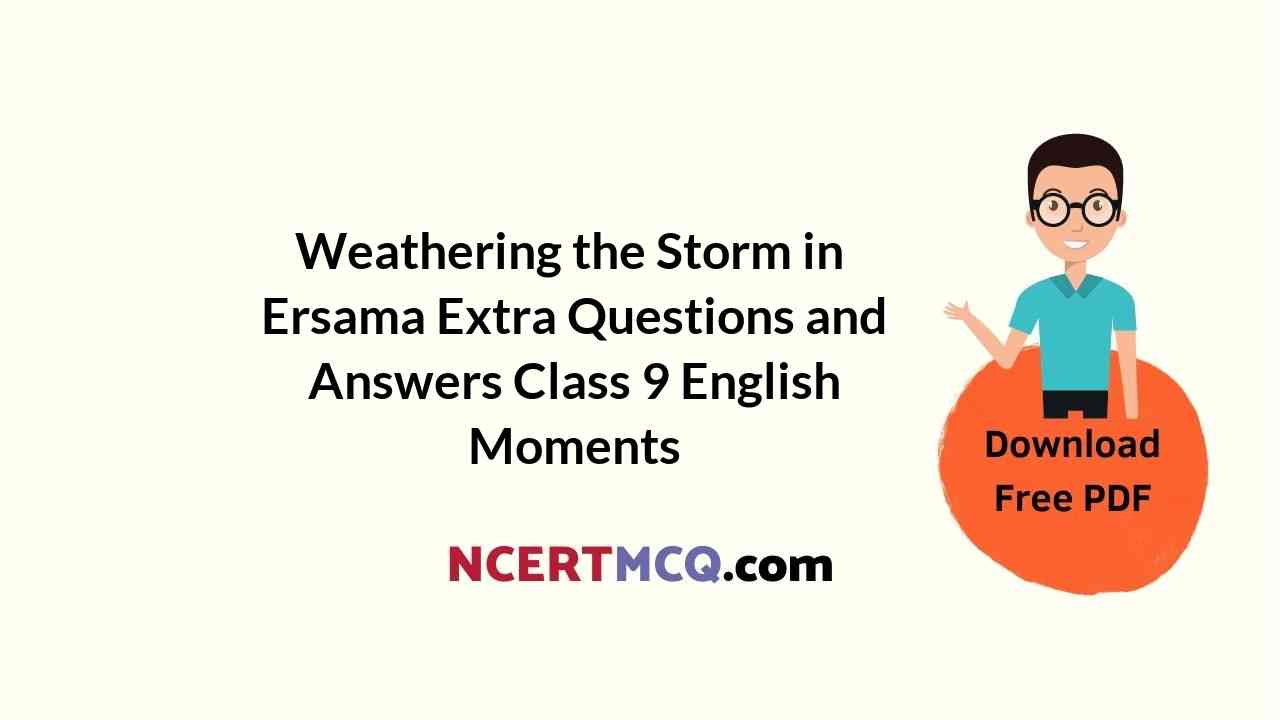Here we are providing Online Education for The Comet 2 Extra Questions and Answers Class 8 English It So Happened, Extra Questions for Class 8 English was designed by subject expert teachers. https://ncertmcq.com/extra-questions-for-class-8-english/
You can refer to NCERT Solutions for Class 8 English It So Happened (Supplementary) Chapter 10 The Comet II Question Answer to revise the concepts in the syllabus effectively and improve your chances of securing high marks in your board exams.
Online Education for The Comet 2 Extra Questions and Answers Class 8 English It So Happened
The Comet 2 Extra Questions and Answers Short Answer Type
The Comet 2 Extra Questions Question 1.
What thought came into minds of Dr. James at night?
Answer:
Dr. James looked up from windows of his room at the star – studded night sky. He felt that amongst *’ those bright stars, a destructive comet was approaching to collide with the earth. He was apprehensive if he had done his calculations correctly.
Comet 2 Extra Questions Question 2.
Whom did Sir John invite for the conference?
Answer:
Sir John invited astronomers, computer scientists, nuclear physicists, space technologies, biologists and Manoj Dutta was the special invite.
Extra Questions Of Comet 2 Question 3.
What was the ‘slight respite’ as per the calculations of the scientists?
Answer:
The scientists at the conference agreed that the comet would hit at the earth. There were small chances’ that it would pass through the earth, but it was certain that it wouldn’t damage in totality. Subsequently, the respite wasn’t enough not take action against it.
Comet 2 Class 8 Extra Questions And Answers Question 4.
What were the possible proposition at the meeting?
Answer:
The experts dismissed defensive measures like living in underground bunkers and decided to take an offensive action. They consented to deflect the path of the comet.
The Comet Extra Questions Answers Question 5.
What was ‘Project Light Brigade’?
Answer:
‘Project Light Brigade’ was a secret operation against the comet. It would need the bulk of destructive nuclear power. The timings and position was great taken care of. The nuclear payload was to be leaded on a spaceship and to be detonated for targeting the comet.
The Comet 2 Class 8 Questions And Answers Question 6.
Why did Indrani Debi arranged a Yajna for Manoj Dutta?
Answer:
Mr. Manoj Dutta had discovered a comet. According to religious sentiment, observing a comet or any other celestial object might have a bad impact on the life and family of that person. Indrani Devi arranged a Shanti Yajna as recommended by Guruji to pacify the evil spirit behind the comet.
Comet 2 Class 8 Questions And Answers Question 7.
What are comets?
Answer:
Comet are celestial bodies consisting of a nucleus of ice and dust and when near the Sun, a ‘tail’ of gas and dust particles pointing away from the sun.
Comet 2 Question Answer Question 8.
Write the description of letter which was sent by Sir John to Mr. Duttada?
Answer:
The message, Duttada received in is a text message. The message was about Christmas present to be purchased by Sir James. The message secret coded, which meant that the Project was successful.
Question 9.
Did Duttada like the Yajna ceremony? Why or why not? .
Answer:
Duttada did not like the Yajna’ ceremony. He even avoided it. His grandson performed rituals in his place.
Question 10.
What happened on December 15?
Answer:
December 15 was the fateful date when comet Dutta could collide with the earth. However the efforts of scientists and other dignitaries paid off and it was diverted with nuclear explosion.
Question 11.
Why did Duttada went to Rasagolla shop?
Answer:
Duttada was anxiously waiting for response from Sir James. On November 18, a special messenger reached him with an urgent telex message. Duttada immediately rushed to his favourite rasagolla
The Comet 2 Extra Questions and Answers Long Answer Type
Question 1.
Write the difference between the thinking levels of Duttada & Indrani?
Answer:
Duttada had scientific approach whereas his wife looked at things religiously. Duttada look at rituals as social taboos that hampers the development. The successful deviation of comet’s path, a joint effort by scientists Indrani Devi gave credits to her Shanti Puja. Duttada was in pain that progressive outlook could not be evoked in mindset of the people. He felt that void between rich and the poor, educated and illiterate.
Question 2.
“For a moment James wondered if he had done his sums right”. Why was James doubtful about his sums and calculations?
Answer:
James became doubtful about his sums and calculations when he looked up from his window and saw a star studded night sky. He knew that somewhere amongst those stars was Comet Dutta, which was heading for a collision with the earth. It was hard for him to believe the calamity of the future on such a peaceful night.
Question 3.
Why did the scientists at the conference say about James ‘sums’?
Answer:
The scientists said that James ‘sums’ were correct and that there was no escape from the direct hit predieted by him. There was a small chance that the comet might just graze the atmosphere of the earth and not collide. In that case, the loss of life and property would not be fatal. However, that was hardly
reassuring. Therefore, they decided to take some action.
Question 4.
Immediate action was needed, the scientists decided. Give one example each of‘defensive’ and ‘offensive’ action mentioned in the text.
Answer:
The approaching comet needed immediate action. The scientists had two options. The defensive measure was that the people should live in bunkers. The offensive action was to do something to deflect the comet from its path. This could be done by exploding a nuclear payload near the comet.
Question 5.
“I am not buying any Christmas presents till December 15”. What did Sir John mean by that?
Answer:
Sir John meant that he was not very sure that they would succeed in their operation. If the experiment failed, the comet would hit the earth on December 15.
Question 6.
What is Duttada expected to do on his return from London?
Answer:
After his return from London he discovered that Indrani Debi had arranged for a “Yajna’ to be performed. ‘ She, along with other family members, planned it toward of evils of the comet’s visit.
Question 7.
What is his reaction to the proposal?
Answer:
Duttada reacted very angrily to the proposal and said that it was all superstition. So he refused to participate in the “Yajna’.
Question 8.
(i) What does ‘Project Light Brigade’ refer to?
(ii) What does Sir John say about the project in his letter to Duttada in October?
Answer:
(i) “Project Light Brigade’ refers to the plan to divert the comet from its path. The plan was to launch a spacecraft and explode the nuclear device near the comet.
(ii) ‘The charge of the Light Brigade has begun’.
Question 9.
Did Sir John buy Christmas presents on December 15? How did Duttada get to know about it?
Answer:
Yes, Sir John bought Christmas presents on December 15. Duttada got to know about it in the letter that Sir John had written to him, saying that he was confident of buying Christmas presents on December 15, indicating that the project was successful.
Question 10.
Why, according to Indrani Debi, had ‘the comet’ not been disastrous? Do you agree with her?
Answer:
According to Indrani Debi it was the effect of the Yajna which did not allow the comet to create disaster on the earth. For someday who is as rationale as Duttada, it is impossible to believe. I, too, oppose her idea. Those who believe in comets bringing bad luck, her idea would appeal.
Extra Questions for Class 8 English
- How the Camel Got His Hump Extra Questions
- Children at Work Extra Questions
- The Selfish Giant Extra Questions
- The Treasure Within Extra Questions
- Princess September Extra Questions
- The Fight Extra Questions
- The Open Window Extra Questions
- Jalebis Extra Questions
- The Comet 1 Extra Questions
- The Comet 2 Extra Questions








